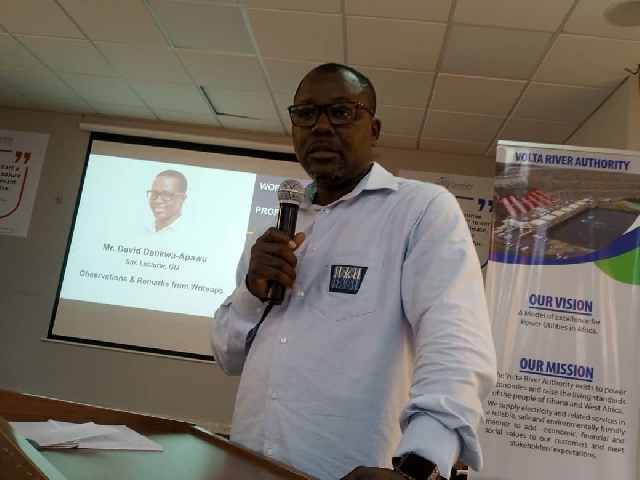Ghana's push for nuclear energy highlighted at media workshop
 Dr. Archibold Buah-Kwofie
Dr. Archibold Buah-Kwofie
In a recent three-day workshop for media professionals, Dr. Archibold Buah-Kwofie, the Acting Director of the Nuclear Power Institute at the Ghana Atomic Energy Commission, underscored the critical role of nuclear energy in advancing Ghana's industrialization efforts.
The workshop, aimed at enhancing understanding and communication of nuclear energy issues, also highlighted the importance of developing nuclear infrastructure as part of a broader strategy for energy security.
Dr. Buah-Kwofie emphasized that the United States government has tasked Ghana with developing its nuclear infrastructure, which is essential for sustainable industrial growth.
He pointed out the significant disparity in the cocoa industry, where Ghana and Côte d'Ivoire produce about 80% of the world's cocoa but earn less than 1% of the global revenue from cocoa products.
This low revenue is attributed to the lack of value addition in the cocoa supply chain, he said.
‘Successive Ghanaian governments have focused on industrialization, but energy supply remains a consistent challenge, as noted by the Association of Ghana Industries (AGI) and surveys like Afrobarometer.
Affordable and reliable energy is crucial for industrial development, and this need has been consistently highlighted over the past 456 years'.
Dr. Buah-Kwofie explained that industrialized nations benefit from accessible and affordable energy sources.
He illustrated global energy trends, noting that countries in the Middle East rely heavily on solar, gas, and oil due to their abundant raw materials.
In Europe, despite a push towards renewable energy, coal remains a key energy source, especially highlighted when Russia cut off gas supplies to the European Union, prompting Germany to restart and build new coal plants to maintain their industrial base load.
He argued that if coal is cost-effective and supports industrial growth, it should not be dismissed outright for developing countries.
Similarly, adding nuclear energy to Ghana's energy mix aligns with global trends and offers a reliable and affordable solution to meet the country's industrial energy demands.
The workshop concluded with a call to action for improved public communication and education on the benefits and safety of nuclear energy, positioning it as a vital component in Ghana's quest for energy security and industrial advancement.
Source: Classfmonline.com/Cecil Mensah
Trending News

More MMDCE nominees confirmed in Eastern Region amid strong support from Assemblies
08:59
GFL challenges TUC’s claim as sole mouthpiece of Ghanaian workers
11:35
Police interdict officer found with restricted pharmaceutical drugs
06:52
E/R: Kwabeng miner vows to protect water bodies
08:49
Youth advocate for reforms in AfCFTA to fight poverty in Africa
09:18
Political parties stage protest over CJ's suspension today!
06:39
Police assualt:Afenyo-Markin reports to police CID
10:37
MoH opens admission for nursing and public health training programmes
07:10
Sugarcane farmers urge Trade Minister to act on Komenda Sugar Factory promises
05:37
“We are going to reset Accra” – new AMA Mayor vows bold transformation
03:42



